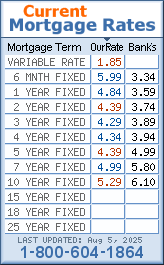|
| | Canadian Real Estate / Mortgage Glossary : D| Results found: 50 | Page: 1 of 3 |
Days on the Market
The period between listing and sale, or listing and a property being taken off the market.
|
Debit
Another name for withdrawal of funds from your account.
|
Debit Bureau
A service used by banks that will eventually track account opening and closing information, cheque order history, cheque writing history, any history of collection activity on unpaid accounts, frequency of debit and ATM card use and household demographics. Under the system, when a consumer presents a cheque to a participating retailer, the individual's account is identified by punching a code into a computer or swiping a card containing a magnetic strip or microchip through an electronic reader, which tells the retailer whether to accept or reject the transaction.
|
Debit Card
A payment card that is linked directly to a customer's bank account. Some cards require a personal identification number. Others require a customer's signature. A PIN-based or direct debit card removes a purchase price from a customer's chequing account almost immediately. A signature-based or deferred debit card has a Visa or MasterCard logo and removes the purchase price from a customer's bank account in two or three days.
|
Debt
Money one person or firm owes to another person or firm.
|
Debt Consolidation
The replacement of multiple loans with a single loan, often with a lower monthly payment and a longer repayment period. It's also called a consolidation loan. Ontario Equity has access to Canada's best debt consolidation products, for more info about debt consolidation see our debt consolidation page.
Click here for additional information.
|
Debt/Equity Ratio
A comparison of debt and equity used to measure the health of a business.
|
Debt Issues
The issuance of bonds or other forms of debt on the public markets.
|
Debtor
Technically, a person who has filed a petition for relief under the bankruptcy laws. More generally, anyone who owes.
|
Deductions
These are expenses the government allows you to subtract from your taxable income. If you have taxable income of $31,000 and deductions of $4,000, then you would figure how much tax you owe on the difference -- $27,000.
|
Deed
A document that provides title to property and is filed with a country recorder.
|
Default
The condition that occurs when a consumer fails to fulfill the obligations set out in a loan or lease.
|
Deflation
An actual decline in the general level of prices in the economy.
|
Delinquency
Failure to make mortgage payments when mortgage payments are due.
|
Delinquent Mortgage
A home loan in which the borrower has failed to make payments on time, as specified in the loan agreement.
|
Demand Loan
A loan that must be repaid in full, on demand.
|
Demographics
Characteristics of the population that influence consumption of products and services. They include age, sex, race, family size, level of education, occupation, income and location of residence.
|
Dependent
A person who relies on someone else for financial support. If you have dependents, you can claim them as exemptions, which will reduce the amount of your income that is taxed.
|
Deposit
A payment made to prove that a buyer is serious about making a given transaction. An earnest money deposit is money a buyer gives to a seller to purchase to prove that he or she is serious about buying the house.
|
Deposit Insurance
The Canada Deposit Insurance Corporation insures depositors' funds to a maximum of $60,000 per depositor, per institution, with some exceptions, in the event of the failure of a federal financial institution. Deposits in some provincial financial institutions are also covered.
|
|

|


